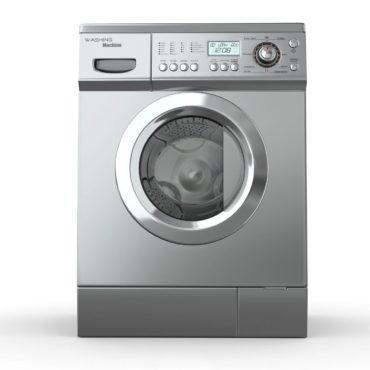
Flushing your washing machine is an important form of appliance maintenance. Not only will regular cleaning extend the life span of the equipment, but it will also help ensure that your clothes look and smell better and that they come out of the washer stain-free. Whether you wash clothes every day or just once or twice each week, you should flush your washing machine out approximately once every 30 days.
Why Do You Need to Flush Your Washing Machine?
Although your washing machine is designed to knock tough stains and odors out of your clothing, the unit can actually get pretty grimy itself. This is largely the result of soap residues, buildups from fabric softeners, and collected matter from the fabrics that get washed in there. While many homeowners don’t often flush their washing machines, and some never flush their machines out at all, taking the time to clean your unit out will help it perform far more efficiently.
Your clothes should look brighter and noticeably cleaner after every wash, and they’ll also be far less likely to come out with brand-new stains. You won’t have to worry about old fabric softener leaving your whites looking dingy and gray or deal with clothes that have undissolved soap powders still caught in their fibers after a cycle has finished. Clearing out buildups of soap and fabric softener can even extend the life span of your washer.
It’s also important to clean out your washing machine on a regular basis if it’s under warranty. Failing to perform regular maintenance for your machine in the form of cleaning and other tasks may void the warranty should the appliance require a repair. The machine’s owner’s manual may include steps you can take to clean and/or maintain the machine as well as advice on service schedules, so be sure to read it thoroughly.
There’s also an environmental aspect to flushing out your washing machine regularly. If you’re environmentally conscious, you may have decided to run your washing machine at lower temperature settings and wash loads using less water. When you wash smaller loads but still use a considerable amount of fabric softener or detergent, your washing machine is less able to flush residues out. Cold water and cool water washes also inhibit the breakdown of many liquid and powder detergents.
Ways to Clean Your Washing Machine
Run a Monthly Service Wash
One of the easiest ways to flush your washing machine is by running a monthly service cycle. Your machine might have a special setting for exactly this purpose. Otherwise, you simply need to run the unit as though it has a full load of clothes but without putting any detergent or clothing in it. Monthly service washes work best when they’re done with high water levels and at high heat settings.
When you run a monthly service wash, consider adding an agent to break down some of the soap scum and other buildups that have accumulated. One of the best additions for this purpose is baking soda. Adding one full cup at the start of the wash should do the trick. You should also take the time to wipe off soap residues on the lid, rim, and other accessible areas at the start or end of this cycle.
Clean the Drum’s Rubber Seal
It’s also a good idea to clean the rubber seal on your washing machine’s drum before or after running a service wash. You can wipe this down with a soft towel and hot, soapy water. You can alternatively use warm water that has a splash or two of chlorine bleach in it instead. This takes mere seconds to complete, but it will keep your washer smelling fresh and in good condition. This is also a great way to prevent buildups of mold or bacteria.
Aerate Your Washing Machine In-Between Washes
Washing machines don’t always have the chance to dry out completely in-between uses. This can be especially problematic if there are long delays between uses and the washing machine lid is kept shut the entire time. When stagnant water has the opportunity to sit in washing machines, foul odors invariably arise. Worse still, you may find that your washer has pervasive problems with mold and mildew at its interior. This is often an issue in households that only perform cold water washes and that never wash clothes or other items with chlorine bleach.
Your washing machine can also be prone to problems with mold and mildew if your laundry room is especially humid. Thus, another thing that you can do to keep your washing machine mold-free and smelling fresh is to make sure that your dryer is properly vented. If your laundry room has a consistently high level of humidity, schedule an appointment to have your dryer vent cleaned out. This is a critical maintenance task that can also lower your likelihood of experiencing a laundry room fire.
One of the best ways to prevent problems with mold and mildew is to aerate your washing machine in-between uses. Although your laundry room might look its best when both the washer and dryer lids are closed, keeping your washing machine door in an open position when it isn’t being actively used is an excellent form of mold prevention. You can even leave the detergent drawer slightly open as well. This will give everything the chance to fully air-dry.
Inspect and Clean the Drain Filter
The drain filter on your washing machine is likely situated right near the front, bottom portion of the unit behind a small door. You should set up a shallow dish or pan at the base of this door before opening it in case any water comes rushing out. You might find lint, loose strings, coins, and other debris here. Clean them out according to the manufacturer’s instructions to ensure that no clogs occur. This is something that you should do each time you flush your washing machine out.
Know When to Get Professional Help
If you flush your washing machine out and are still greeted by foul, pungent smells each time you open it, it’s definitely time to call the professionals in. You may have problems that a simple flush cannot correct. Having a licensed repair technician determine the underlying cause of these odors and resolve them could spare you the trouble of having to replace the entire unit. You also want to call for professional help if your washer has recently been flushed but is leaving your clothes looking stained or otherwise worse for the wear after use.
When flushing your own washing machine out with a quick service wash isn’t sufficient, you can always have appliance repair professionals perform a thorough washing machine flush for you. At Apex Plumbing, we offer an expansive range of services including sewer excavation, drain cleaning, and burst pipe repairs. Residents of the Columbus, Ohio, area can always count on us to keep their washing machines looking, smelling, and working their absolute best. If you need help performing a washing machine flush, call us today to schedule an appointment.





